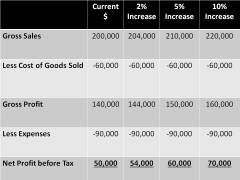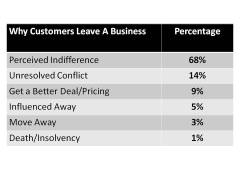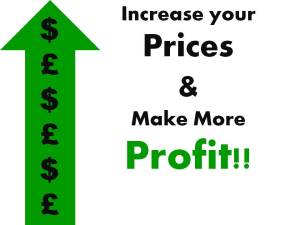Increase Your Prices & Make More Profit
If your prices are too low, your market will label you a low-end player and you’ll attract bargain hunters who will invariably try to get you to discount your products even further. Lower prices also make it unlikely your business will build long-term relationships with such customers, who by their very nature will shop around to get the best prices on a product or service, not staying loyal to any one business.
Higher pricing raises customers’ expectations of a business, which can be a challenge. But if you constantly deliver on those expectations your business will usually enjoy customer loyalty, and you will attract a better quality customer that is willing to pay more for quality customer service.
Everything I do with my clients is about helping their businesses make BIG Profits. Remember, there are only two ways in which a business can grow its profit:
- Increasing sales
- Reducing expenses
Let’s take a look at the impact a price increase could have on the profitability of a business. For this simple exercise, business XYZ has 200 customers. The average value of a sale is $1,000 and the cost of goods sold for each product is $300. The business’s fixed costs are $90,000 per annum. The table below demonstrates the impact of XYZ increasing its prices by 2 percent, 5 percent, and 10 percent.

In this example, when there is a 2 percent price increase, the business profit increases by $4,000 per annum or 8 percent in one year. With a 5 percent price, increase the profit increases by $10,000 or a 20 percent increase. With a 10 percent price increase, the profit of the business increases by a whopping $20,000 or 40 percent.
With all things being equal, increasing your prices by a small amount results in a compounding increase in profit. It is important to note that increasing prices has no impact on cost of goods sold, which is based on quantity of products sold not the sales price.
When considering whether to increase your prices, ask yourself, “Am I likely to be losing customers?” If your answer is ‘yes’ or ‘I am not sure’, then your customers are only thinking about leaving as they do not understand your value proposition for them, or you do not deliver enough value to your customers to justify the price increase.
It comes down to branding. What does your business, your brand stand for? What is the promise you make to your customers? Branding is about building a relationship with your customers, and over time they expect certain things from your brand, as that is what you have promised them.
A brand can turn something that is pedestrian or homogenous into something that is unique and that stands out from the crowd, regardless of the market. If a business is branded it can set you apart from the rest. A strong brand builds respect, loyalty and retention, and allows a business to set its pricing strategy accordingly.
What is your branding saying about you and your business in the market? Is your business delivering on its promises to its customers?
Dr Michael LeBoeuf, international business consultant, focuses a lot of his work on how to win customers and keep them. He created a matrix based on extensive research on why customers leave a business.
 Based on that research, of those customers who leave a business, only 9 percent leave due to pricing, whereas 82 percent of customers leave because they are not treated as special or there is an unresolved conflict. In essence, they leave due to a lack of customer service.
Based on that research, of those customers who leave a business, only 9 percent leave due to pricing, whereas 82 percent of customers leave because they are not treated as special or there is an unresolved conflict. In essence, they leave due to a lack of customer service.
Therefore, key to the success of your business is not worrying about the price you charge your customers, but concentrating on the customer value proposition you deliver to your customers to keep them happy and returning for more. It’s about going beyond the call of duty to provide value and service to your customers. It’s about creating customer cheerleaders, customers who will be loyal to your business for a long time, and at the same time, will refer their family and friends to your business .
Think about this second question: “If you do increase your prices, will you be the most expensive business in your industry?”
Your answer is highly likely to be no. If the answer is yes, then you are at the premium end of your industry serving the most discerning customers, and therefore price is unlikely to be the most important factor in their decision making process. Even if you are at the premium end of the market, there is a strong argument that you should still raise your prices, making sure your customer service remains second to none, as it is the value proposition your business offers your customers that they will be most interested in.
My approach to pricing is: charge what you and your business are worth. Don’t undersell yourself. Brand your business, deliver on the promise, and you will be able to easily increase your prices and no-one will notice as they will be rapt with the way in which your business delivers value to them.
It comes down to a simple equation. For every $1 you charge your customers, make sure you are delivering more than $5 in value to them. Consistently do that, regardless of your pricing in the market, and you will not lose customers…. and you will grow your business as your reputation for excellent value will precede you as your customers will become your cheerleaders.
Sound like good business practice? I think so. It is a win/win business strategy.
Could some guidance from me be helpful to you? If so, please arrange a free 30 mins Skype strategy meeting with me. Here’s my calendar to book a meeting. I’d love to support you in some way to gain ‘seductive clarity’ in any aspect of your business or life.
Other articles on Branding, Marketing and Pricing:
Do You Compete on Price? Bad Business Decision!!
Is Customer Service YOUR Key to Business Success?
Creating Superior Customer Value – do you do that in your business?
Which are Your Most Profitable Customers?
Finding Customers via LinkedIn
Using YouTube for Finding Customers
Who Wants High Customer Retention?
What is a Customer?
What is Business Marketing?
What’s Your Personal Brand?







